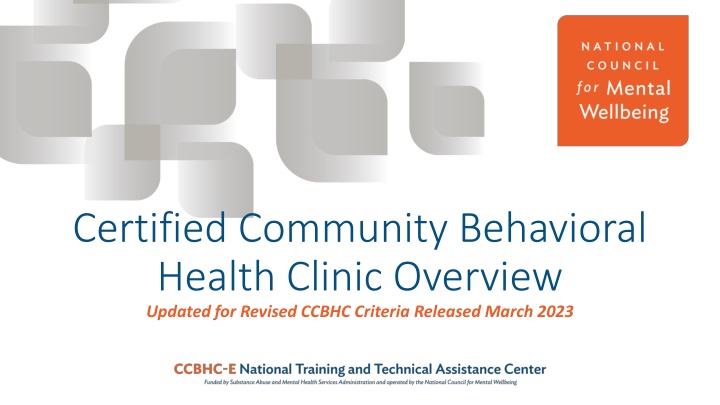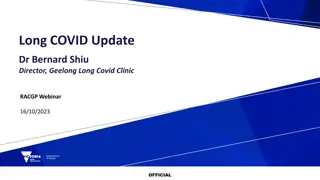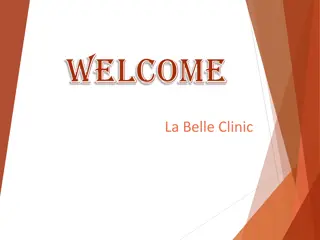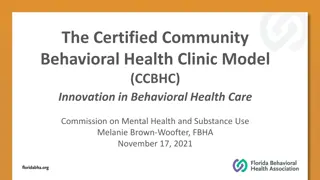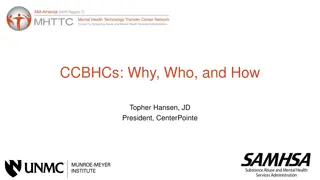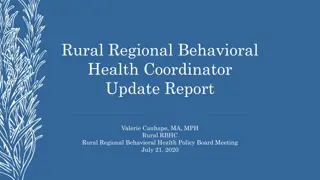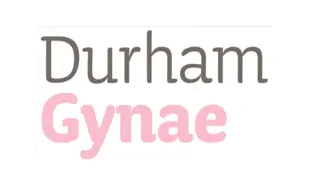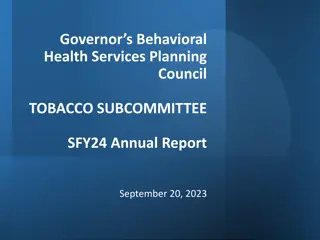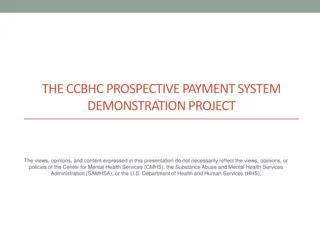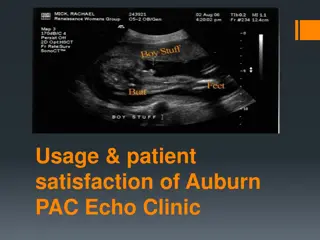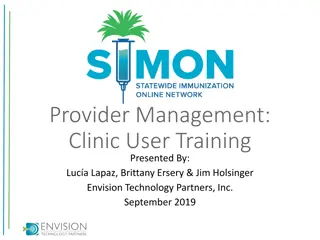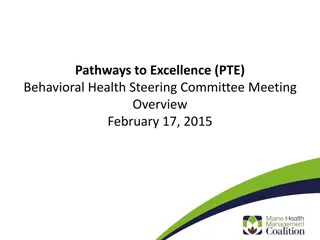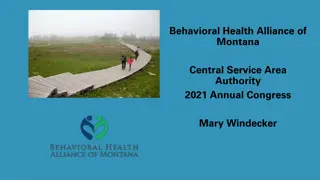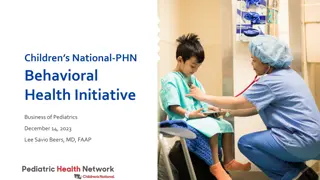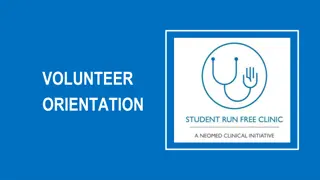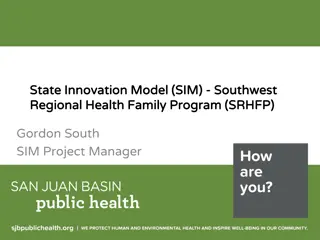Overview of Certified Community Behavioral Health Clinic (CCBHC) Model
The Certified Community Behavioral Health Clinic (CCBHC) model aims to enhance service quality and accessibility by offering integrated, evidence-based, person- and family-centered care. CCBHCs provide a full range of mental health, substance use, and primary care services while emphasizing care coordination, community engagement, and quality reporting. The program requirements include staffing driven by community needs, service availability, care coordination, service scope, quality measures, and organizational governance. For more details on CCBHC criteria, visit https://www.samhsa.gov/certified-community-behavioral-health-clinics/ccbhc-certification-criteria.
Download Presentation

Please find below an Image/Link to download the presentation.
The content on the website is provided AS IS for your information and personal use only. It may not be sold, licensed, or shared on other websites without obtaining consent from the author.If you encounter any issues during the download, it is possible that the publisher has removed the file from their server.
You are allowed to download the files provided on this website for personal or commercial use, subject to the condition that they are used lawfully. All files are the property of their respective owners.
The content on the website is provided AS IS for your information and personal use only. It may not be sold, licensed, or shared on other websites without obtaining consent from the author.
E N D
Presentation Transcript
Certified Community Behavioral Health Clinic Overview Updated for Revised CCBHC Criteria Released March 2023
This publication was made possible by Grant No. 1H79SM085856 from the Substance Abuse and Mental Health Services Administration (SAMHSA). Its contents are solely the responsibility of the authors and do not necessarily represent the official views, opinions or policies of SAMHSA, or the U.S. Department of Health and Human Services (HHS).
What is a Certified Community Behavioral Health Clinic (CCBHC)? CCBHC is a model of care that aims to improve service quality and accessibility. CCBHCs are required to serve anyone who requests care for mental health or substance use, regardless of their ability to pay, place of residence or age including developmentally appropriate care for children and youth. CCBHCs do the following: Coordinate care with other behavioral health, physical health, and social services systems in the community. Provide integrated, evidence-based, trauma- informed, recovery- oriented and person- and family-centered care. Offer the full array of CCBHC-required mental health, substance use and primary care screening services.
CCBHC Criteria Program Requirements Staffing plan driven by community needs assessment. Licensing and training to support service delivery. 1. Staffing 2. Availability and Accessibility of Services Standards for timely and meaningful access to services, outreach and engagement. 24/7 access to crisis services, treatment planning and acceptance of all patients regardless of ability to pay. Care coordination agreements across services and providers. Defining accountable treatment team, health information technology and care transitions. 3. Care Coordination 4. Scope of Services Nine required services, as well as person-centered, family-centered and recovery-oriented care. 5. Quality and Other Reporting 21 quality measures, a plan for quality improvement and tracking of other program requirements. 6. Organizational Authority, Governance and Accreditation Consumer representation in governance. Appropriate state accreditation. Note: This presentation contains a summary of selected CCBHC certification criteria. To view the full criteria: https://www.samhsa.gov/certified-community-behavioral-health-clinics/ccbhc-certification-criteria
Scope of Services 4.A-4.K CCBHC The CCBHC organization will deliver the majority of services under the CCBHC umbrella directly rather than through DCOs (i.e., a majority of total service volume delivered across the nine required services). Crisis Services Screening, Assessment and Diagnosis Person- centered and Family- centered Treatment Planning Outpatient Mental Health and Substance Use Services Primary Care Screening and Monitoring Targeted Case Management Services Peer Supports and Family/ Caregiver Supports Community Care for Uniformed Service Members and Veterans Psychiatric Rehabilitation Services
CCBHC Funding Pathways There are currently three funding pathways for CCBHCs: 1. Section 223 CCBHC Demonstration Program: This includes states awarded the opportunity to participate in the Section 223 CCBHC Demonstration Program established in 2017. These states establish a process for state certification for eligible clinics utilizing the federal CCBHC criteria, and clinics receive a Prospective Payment System (PPS) rate. 2. Independent State Medicaid-funded CCBHC Programs: This includes states that have enacted the CCBHC program through a Medicaid State Plan Amendment or Waiver with approval from The Centers for Medicare & Medicaid Services (CMS). These states establish state-specific eligibility criteria and a process for certification of eligible clinics. 3. SAMHSA-administered CCBHC Grant Program: SAMHSA awards grant funding directly to clinics to support adoption and implementation of the CCBHC model. Receiving grant funding is not the same as certification. Grant recipients that have not received state certification either because the state does not certify CCBHCs or because the organization is not an entity that has received state certification must submit an attestation to SAMHSA describing how they are meeting the federal CCBHC criteria requirements.
The Bipartisan Safer Communities Act included provisions for expansion of the CCBHC Medicaid Demonstration Program. CCBHC National Movement 2017 2019 2020 2021 2022 Beginning July 1, 2024, and every two years thereafter, the legislation allows up to 10 additional states to join the demo. 8 21 states 33 states 42 states 46 states states 66 clinics 113 clinics 229 clinics 430 clinics 500+ clinics
Early Impact Since inception of the model, CCBHCs report: CCBHCs expand service delivery services outside the clinic. The top locations included clients homes (78%), schools (97%), courts, police offices and other justice-related facilities (86%), and emergency departments (20%). STAFFING: Increased recruitment and hiring of staff, greater staff satisfaction and retention, redesigning care teams. ACCESS: Decreased wait times for care and elimination of wait lists, targeted outreach to vulnerable, underserved and complex populations, expanding services offered outside the four walls of the clinic. COMMUNITY IMPACT: Improved partnerships with schools, primary care, law enforcement, hospitals. HEALTH IMPACT: Reduced hospitalizations/ED visits, improvements in physical health indicators.
Early Impact 71% 87% The average wait time for services is 48 days nationwide. see clients for their first appointment within one week. see clients within 10 days. https://www.thenationalcouncil.org/resources/2022-ccbhc-impact-report/
Why CCBHC? The Vision for [Insert Org Name] Tailor this slide to communicate your organization s mission and vision and create direct connections to how CCBHC status furthers those aims. Example: VISION: Healthy Living for Everyone. MISSION: Our mission is to improve the lives of people affected by mental health and substance use challenges through an array of effective, person-centered services. WHY CCBHC? o Person, family and community-centered care design Criteria is intentionally designed with community needs assessment as the driver for staffing and service array. o Focus on access and care coordination Meets the needs and challenges in accessing services of those we serve and extends how we engage them outside the four walls of the clinic. Takes into account non-health related needs. o Filling gaps in services Allows us to expand services in areas of need we haven t previously been able to invest in.
[Insert Org Name] CCBHC Commitments Tailor this slide to communicate the commitments you made in your CCBHC grant application to ensure staff are clear on the goals, targets and implementation activities they can expect to be part of. These can be spread across several slides if needed to cover all. Who we will serve: Services and evidence-based practices we will provide: Who we will partner with: Staffing and training expectations: Infrastructure Investments we will make:
Discussion What excites you about becoming a CCBHC? How do you see this impacting those we serve? What connections can you make to the model and common challenges or barriers we experience in our work? What questions do you have about the model?
Resources The CCBHC Criteria On-Demand Lessons are a suite of 30- to 60-minute recorded lessons that provide an overview of the CCBHC model and take a deeper dive into CCBHC program requirements. On-Demand Recordings: CCBHC 101 Scope of Services Staffing Quality and Other Reporting Care Coordination Organization Authority, Governance and Accreditation Availability and Accessibility
Staffing 1.A-1.D Needs Assessment General Staffing Requirements (1.A) KEY REQUIREMENT HIGHLIGHTS Licensure and Credentialing of Providers (1.B) Required staff: Clinical and peer staff; psychiatrist as medical director; medically trained behavioral health care provider; individuals with expertise in addressing trauma, SED, SMI, SUD. Cultural Competence and Other Training (1.C) Linguistic Competence (1.D) Required regular training includes cultural competence, trauma-informed care and integration.
Access and Availability 2.A-2.E KEY REQUIREMENT HIGHLIGHTS General Requirements of Access and Availability (2.A) Services available to all individuals, regardless of age and ability to pay, at times and locations most accessible for those being served (including community, home-based and telehealth). Requirements for Timely Access to Services and Initial and Comprehensive Evaluation (2.B) 24/7 Access to Crisis Management Services (2.C) No Refusal of Services Due to Inability to Pay (2.D) Individuals seeking services receive a preliminary triage and are provided immediate access if they are in crisis, service within one business day for urgent needs and within 10 days for routine needs. Provision of Services Regardless of Residence (2.E)
Care Coordination 3.A-3.D General Requirements of Care Coordination (3.A) KEY REQUIREMENT HIGHLIGHTS Care Coordination and Other Health Information Systems (3.B) The CCBHC coordinates across the spectrum of health services and has protocols in place for care coordination. Care Coordination Partnerships (3.C) Care Treatment Team, Treatment Planning and Care Coordination Activities (3.D) The CCBHC has an HIT system in place that captures demographic info, provides clinical decision-making and can electronically transmit prescriptions.
Quality and Other Reporting 5.A-5.B Data Collection, Reporting and Tracking (5.A) KEY REQUIREMENT HIGHLIGHTS Both Section 223 Demonstration CCBHCs and CCBHC grantees must collect and report the required clinic-collected quality measures identified in Appendix B. Continuous Quality Improvement (CQI) Plan (5.B) CQI plans to address: (1) deaths by suicide or suicide attempts of people receiving services; (2) fatal and non-fatal overdoses; (3) all-cause mortality among people receiving CCBHC services; (4) 30-day hospital readmissions for psychiatric or substance use reasons.
General Requirements of Organizational Authority and Finances 6.A-6.B General Requirements of Organizational Authority and Finance (6.A) KEY REQUIREMENT HIGHLIGHTS Governance (6.B) A CCBHC must either be a nonprofit, government clinic or Indian Health Service. Accreditation (6.C) The CCBHC will incorporate meaningful participation from individuals with lived experience of mental and/or substance use disorders and their families, including youth (51% of the board).
CCBHC-Expansion Grantee National Training and Technical Assistance Center We offer CCBHC grantees Virtual Learning Communities, Webinars and Office Hours Regular monthly offerings that are determined based on grantees expressed needs. Opportunities for Collaboration with Other Grantees Monthly Peer Cohort Calls for CCBHC Program Directors, Executives, Evaluators and Medical Directors. Direct On-demand Resource Library Includes toolkits, guidance documents, and on-demand learning modules. Consultation Request individual support through our website requesting system and receive 1:1 consultation. Access our website to register for upcoming events, submit a consultation request or scan our on-demand resource library: https://www.thenationalcouncil.org/program/ccbhc-e-national-training-and-technical-assistance-center/
Questions or Looking for Support? Visit our website and complete the CCBHC NTTAC Request Form NTTAC Request Form CCBHC- -E E thenationalcouncil.org/program/ccbhc-e-national- training-and-technical-assistance-center/request- training-assistance/
